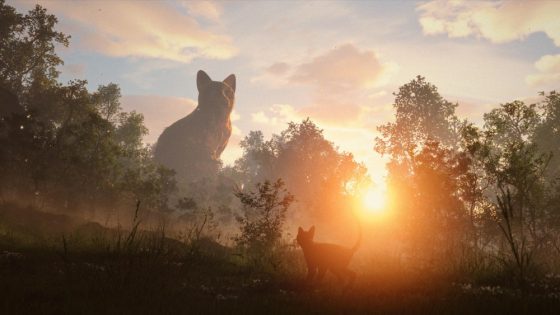An adorable black cat with luminous amber eyes fends for itself in “Flow,” snatching a fish from a pack of distracted mutts and dashing off with its loot while the dogs chase just a few seconds behind. Visionary animator Gints Zilbalodis’ virtual camera swoops after the cat, revealing a crisp, computer-generated world where humans are oddly absent, but their influence can be acutely felt.
Perhaps that explains what happens next, as a near-biblical flood of water — which may well be the result of manmade climate change, though Zilbalodis never specifies — brings a herd of wild animals stampeding in its direction. The cat’s ears flatten, and it crouches low to the ground, much like “The Lion King” did in that film’s iconic wildebeest scene, as a giant wave comes thundering after the deer. Seconds later, the forest is underwater, and the cat is desperately trying to stay afloat. (The deer seem to have disappeared entirely, as things tend to do in a film that remains doggedly committed to its lead cat.)
This impressive opening shot lasts more than four minutes and simply wouldn’t be possible in live action for as many reasons as a cat has whiskers. Even with the use of drones, cameras can’t move as nimbly through space as Zilbalodis conveys us, achieving an instant kinship between audiences and his feline protagonist. But there’s also the obvious fact that no filmmaker could train animal actors to do what Zilbalodis’ imagination demands — as suggested by that apocryphal story of multiple kittens being dropped off a cliff to get the shot in “The Adventures of Milo and Otis.”
In practically every respect, “Flow” could only be animated. And it could only be animated as hynotically as this by Zilbalodis, the one-man world-builder responsible for the 2017 indie marvel “Away.” At his new film’s Cannes premiere, the young Latvian auteur explained how, after dedicating a solitary three and a half years to the making of “Away,” “Flow” represents the supportive coming-together of a team — a notion that becomes increasingly clear as the cat’s survival depends on the other species it encounters along its captivating journey.
Little by little, the ensemble expands to include elegant cranes and bauble-hoarding lemurs, a Lovecraftian-looking whale and a random marmot, each of which come to the cat’s aid at different points in its travels. The animals don’t talk in “Flow,” but they don’t behave quite like animals either — as when they commandeer an abandoned sailboat. Still, their silence marks a crucial difference between this project and the relatively anthropomorphic tradition of American cartoons, even if Zilbalodis intends for us to read a human allegory into what his cast experiences over an epic 85 minutes.
The dogs are the first animals to break character, piling into a rowboat as the water rises and beckoning the cat aboard. Whereas they’d been chasing the black cat just before, the pack now seem to recognize the greater crisis and extend a helping paw — although one of the film’s challenges is how to read the motivations of animals limited to a narrow range of expressions. Consider this: The film is about a wary creature learning to trust others. “Flow” is something of an anomaly in that it puts greater weight on rich, impeccably lit environments than it does on character animation.
That’s consistent with Zilbalodis’ style (“Away” featured just one person, who never spoke, and barely emoted), and yet, seeing as how he has a team of collaborators this time around, it’s reasonable to expect that the animals’ performances be more nuanced. Instead, the movie looks a bit like a high-resolution video game (“Myst” comes to mind) or a very fancy screensaver, where the critters appear suspended against all those dazzling 360-degree vistas, with little sense of weight or gravity. If anything, the film’s many long, floating plans-séquences make everything feel slightly more artificial. That might not bother young viewers, but it defies the physics-based principles of CGI.
Though “Flow” looks pleasing to the eye, it isn’t expressionistic enough in style to forgive these technical shortcomings. You know that feeling when you revisit a computer-animated cartoon that blew you away at the time (say, an early “Shrek” installment or the now-prehistoric “Ice Age”) and realize that a few years on, the technology doesn’t hold up? The trouble with “Flow” is that it already looks dated — commendable to be sure, yet rudimentary at the same time. It’s as if Zilbalodis decided to dump an ocean’s worth of water in the Uncanny Valley.
Still, animal-loving viewers will bond almost instantly with the cat and its motley companions. From Jiji, the feline sidekick in “Kiki’s Delivery Service,” to Bob, who stole the show in Skydance’s “Luck,” this movie’s nameless star has tough competition from other animated black cats. But it’s tough to resist those golden eyes, or the way “Flow” incorporates all kinds of endearingly cat-like behavior, from knocking objects off ledges to swatting at the lemur’s dangling tail.
That darn cat may have started out as a loner, but by the end, this small cadre of creatures have saved one another enough times to be inseparable. “Flow” illustrates that beautifully via a group reflection that contrasts beautifully with the opening shot of the cat staring down and seeing only himself in the water. Don’t scamper off the instant the credits roll, as there’s a satisfying glimpse of one character’s fate hidden at the end.
Source Agencies




